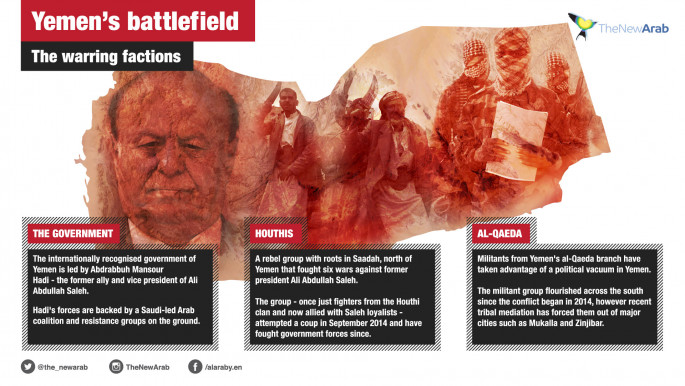Yemen's peace plan in jeopardy as new clashes erupt
At least 20 fighters were killed in a round of fresh clashes across Yemen on Sunday, military officials said.
Among those killed were 14 Houthi rebels and six fighters loyal to the internationally-recognised government.
Among the dead was loyalist General Yehia al-Khayati who died at a Saudi hospital after suffering injuries during clashes in a town close to the kingdom's border with Yemen.
Further south on the outskirts of the oil-rich Usailan district of Shabwa province, rebel forces attacked loyalist positions sparking clashes that killed 12 insurgents and five pro-government soldiers, another military source said.
Yemen has been rocked by war since the Houthi rebels and their allies expanded from their northern historic strongholds seizing the capital Sanaa and other parts of the country.
The conflict escalated when Saudi Arabia formed a coalition of Arab states that have been bombing rebel positions since March 2015 in support of Yemen's government.
The UN's attempts to convince the warring parties to agree on a ceasefire and return to peace talks have so far failed.
The latest fighting comes as UN envoy Ismail Ould Cheikh, who arrived in the insurgent-held capital on Thursday for his second visit in a week, proposed a peace plan last month that was designed to halt fighting.
The Mauritanian diplomat has led talks in Yemen since April 2015 and brokered several ceasefires that were often violated and failed to generate momentum towards a peace deal.
Hadi last week rejected the UN proposal, while the rebels said it was "basis for discussion" despite containing "fundamental flaws". But on Friday rebel ally and former president Ali Abdullah Saleh said the plan was a "good basis" for talks to end "military operations carried out by Saudi Arabia".
But on Friday rebel ally and former president Ali Abdullah Saleh said the plan was a "good basis" for talks to end "military operations carried out by Saudi Arabia".
Houthi supporters held anti-peace plan protests outside the UN diplomat's hotel over the weekend, believing the road map favours President Abd Rabbo Mansour Hadi's government.
However, the contents of the UN roadmap have not been made public.
Sources suggest it calls for an agreement on naming a new vice president after the rebels withdraw from Sanaa and other cities and hand over heavy weapons to a third party.
This is a request consistently made by the government since negotiations began.
Hadi would then transfer power to the vice president who would appoint a new prime minister to form a government in which the north and south of Yemen would have equal representation.
Nearly 10,000 people have been killed so far - more than half of them civilians - while another three million are displaced amid a spread of malnutrition and disease.





 Follow the Middle East's top stories in English at The New Arab on Google News
Follow the Middle East's top stories in English at The New Arab on Google News

![Israeli forces ordered bombed Gaza's Jabalia, ordering residents to leave [Getty]](/sites/default/files/styles/image_330x185/public/2176418030.jpeg?h=a5f2f23a&itok=_YGZaP1z)
